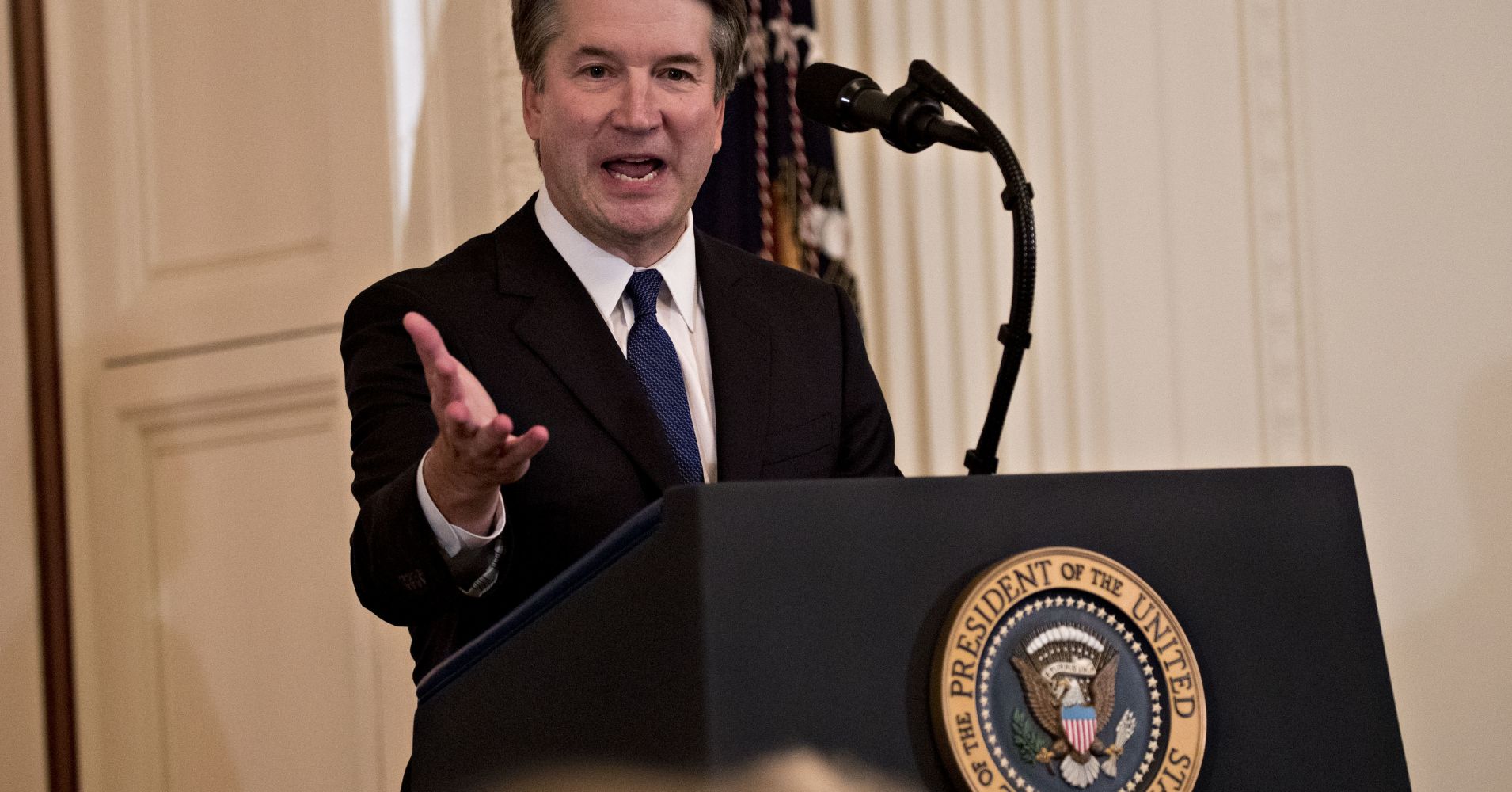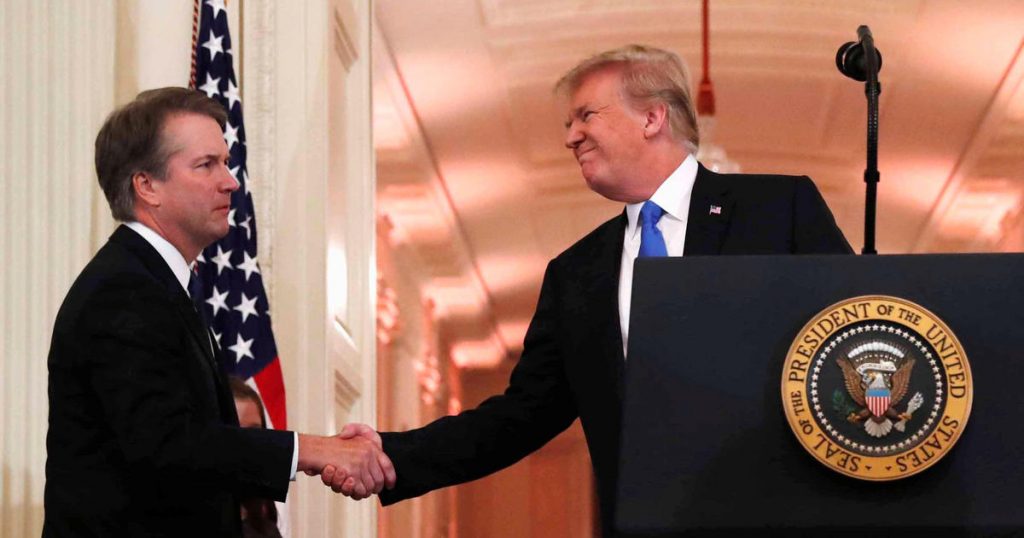
For two weeks, President Donald Trump kept America guessing: In the high stakes political drama concerning who he would pick to succeed Justice Anthony Kennedy on the Supreme Court, the president’s top choice appeared to change day-by-day.
In the end, though, the president went with establishment favorite Brett Kavanaugh, an experienced Washington, D.C., Republican with ties to former President George W. Bush, and the first choice of Trump’s White House counsel Donald McGahn.
Kavanaugh, a judge on the U.S. Court of Appeals for the District of Columbia Circuit, has extensive legal credentials, but his ties to a number of high-profile political scandals have drawn criticism from Democrats and wariness from a number of Republicans.
Throughout Kavanaugh’s confirmation process, senators will likely scrutinize his role in a report outlining the case for impeaching former President Bill Clinton. The issue has increased political salience right now, as some Democrats call for Trump’s impeachment.
His past rulings against knocking down parts of the Affordable Care Act — the health care law Trump promised to shred — could also play a role in the evolution of U.S. policy, as the top court may hear more challenges to the law.
Still, Kavanaugh appears set to lay down mostly conservative rulings on issues that matter to Republicans. Combined with the confirmation of fellow young conservative Justice Neil Gorsuch last year, the Kavanaugh nomination follows through on what Trump promised as a candidate and conservatives hoped would come to pass following his election.
“He’s someone who is very experienced as an appellate judge, who has already shown himself to be a strong and clear writer, a persistent but polite questioner at oral argument, and someone with a strong bent toward an originalist interpretation of the Constitution,” said Willy Jay, a former assistant to the solicitor general, who has argued cases before Kavanaugh in Washington.
Kavanaugh, who spent five years working for President George W. Bush, including in the crucial role of staff secretary, was notably missing from the first two iterations of Trump’s list of potential Supreme Court nominees. Kavanaugh ultimately made the list last fall despite Trump’s criticisms of Bush and the Washington “swamp.”
Kavanaugh’s ties to Bush and other political controversies held up his confirmation to the D.C. Circuit for three years after Bush first named him to the bench in 2003. At a 2006 confirmation hearing, Sen. Chuck Schumer, D-N.Y., raised the issue in an exchange that’s likely to re-appear as Kavanaugh heads to his Supreme Court confirmation hearings.
“From the notorious Starr report, to the Florida recount, to the president’s secrecy and privilege claims, to post-9/11 legislative battles including the Victims Compensation Fund, to ideological judicial nomination fights, if there has been a partisan political fight that needed a very bright legal foot soldier in the last decade, Brett Kavanaugh was probably there,” Schumer, now the top Senate Democrat, said at the time.
Leading up to the announcement, Schumer signaled he would oppose whomever Trump nominated.
In statements posted to Twitter earlier this month, Schumer claimed that Kavanaugh passed Trump’s “litmus test” on potential cases overturning Roe v. Wade, the 1973 ruling legalizing abortion nationwide, and striking down protections for people with pre-existing conditions enshrined in Obamacare.
Abortion rights are critical in this confirmation process, as Trump expressed his willingness to overturn the Roe ruling and GOP Sens. Susan Collins of Maine and Lisa Murkowski of Alaska could sink a nominee if the judge shows a willingness to overturn the decision.
Kavanaugh’s part in the report summarizing the basis for Clinton’s impeachment will likely emerge in his Senate confirmation hearing. While Democratic leaders have not yet called to remove Trump from office, legal developments in the coming months or Democrats taking control of the House in November’s midterm elections could throw the issue to the forefront.
While working in the office of the independent counsel Kenneth Starr, who was investigating Clinton’s affair with White House intern Monica Lewinsky, Kavanaugh listed 11 grounds for Clinton’s removal from office.
A claim in the Starr report that could most concern Trump is its contention that Clinton’s refusal to testify in front of a grand jury was a reason for Congress to consider drawing up articles of impeachment.
Trump and his attorneys have gone back and forth over whether the president will testify or sit for a voluntary interview in connection with special counsel Robert Mueller’s Russia probe. In recent weeks, the president’s legal team has opted to limit its cooperation with the special counsel compared to its relatively open stance in the early days of the investigation.
The president’s outside attorney, Rudolph Giuliani, has said that Mueller will need to show that he has evidence the president committed a crime before he will advise his client to sit for an interview.
Years after the Clinton investigation, Kavanaugh appeared to walk back his aggressive posture toward presidential probes. In 2009, he said indicting a sitting president would “ill serve the public interest.”
Kavanaugh is a conservative who is expected to push the Supreme Court to the right on a number of issues concerning government regulation and the environment. But he has also diverged from the Republican line on a number of issues, including the hot-button topic of Obamacare.
In two oft-cited dissents from 2011 and 2015, Kavanaugh argued against striking down elements of former President Barack Obama’s signature health legislation. In his 2011 dissent, Kavanaugh relied on an obscure statute to avoid ruling on the issue. In 2015, Kavanaugh more directly wrote that Obamacare was not an unlawful tax.
In another 2015 dissent, Kavanaugh found that the government had a compelling interest in ensuring the availability of contraception.
On some issues, however, particularly those related to business regulation, Kavanaugh has come down further to the right than the other Republican appointees to the Supreme Court.
“The most honest way to describe his judicial philosophy is that what the Republican Party wants is constitutional, and that some of what the Democratic Party wants is unconstitutional. The rest is playing out details of doctrinal analysis,” said Mark Tushnet, a leading constitutional law scholar at Harvard who served as a law clerk to Justice Thurgood Marshall.
“The center of gravity of the court is going to change,” he added.
For instance, Kavanaugh’s strict interpretation of which rules regulators are allowed to create swings further right than that of Chief Justice John Roberts, an appointee of George W. Bush.
In the 2016 case United States Telecom Association v. Federal Communications Commission, Kavanaugh outlined his legal philosophy concerning the discretionary authority of the executive.
Roberts ruled in the 2015 Obamacare case King v. Burwell that where a statute was open to interpretation, it was generally up to the courts to decide what the statute meant. In contrast, Kavanaugh took a stricter stance, finding that unclear rules are generally unenforceable, an interpretation which could drastically limit the power of government regulators.
“If a statute only ambiguously supplies authority for the major rule, the rule is unlawful,” he wrote.

